Flipped Classroom Success Stories
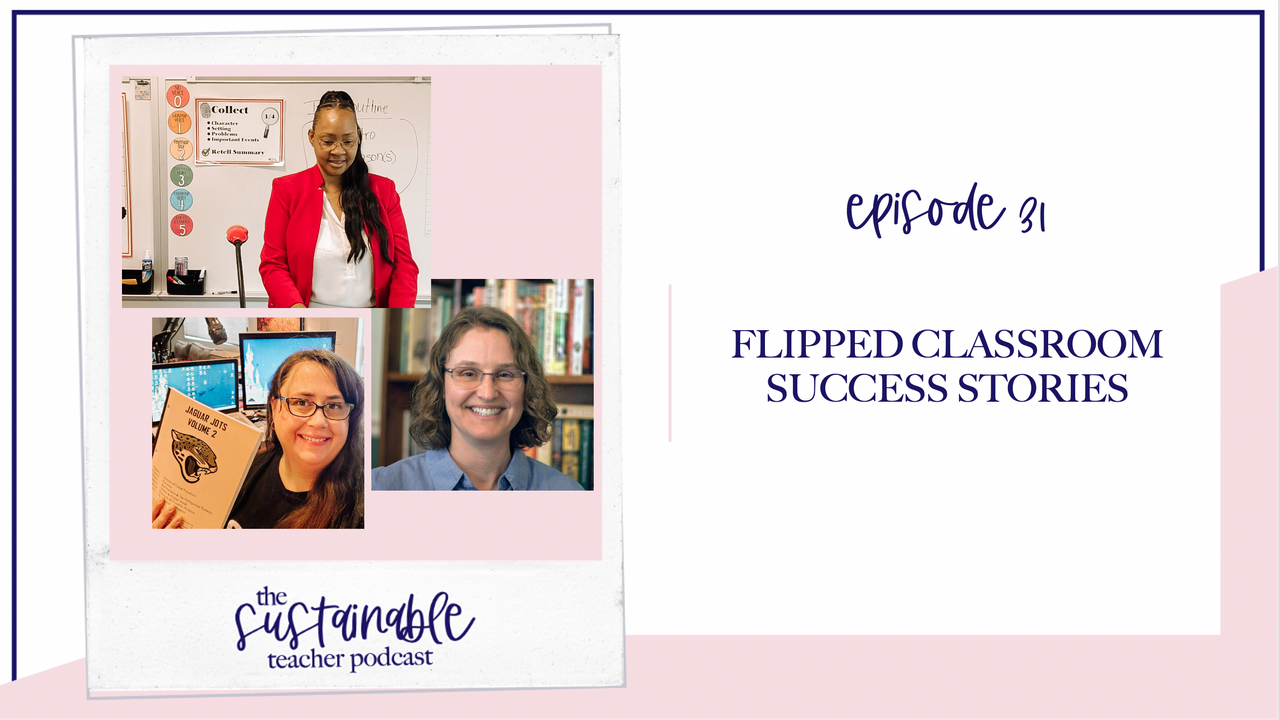
Brenda in 4th grade, Keri in 7th grade math, Jessica in high school chemistry, Megan in Algebra 2, and Charles in high school ELA… all are teachers who flipped their classrooms this past school year and are now on the other side of their hard work reaping the rewards of the flipped model and ready to share their own and their student success with you.
I’m compiling experiences into this one episode and hope that the stories shared allow you to see the possibilities for your own classroom and daily teaching life.
After listening to this episode you’ll be inspired by the success teachers of the flipped classroom have found, and see yourself in their transformation, knowing that this time next year, your classroom or student success story will be told.
Let’s get to it.

Before we get started I want to point you to a resource that I think you’ll love seeing and that is all of the stories I’m going to be sharing with you today and WAY MORE are available to you and anyone else who wan...
Overcoming the Game of Grades with Your Students

I’m betting you’ve had a student come to you at the end of the semester or grading period to ask if there’s anything they can do to improve their grade, and your answer is, yes, you could’ve cared and done your work months ago - but caring now is too little too late.
Or maybe you’ve had a student come to you about how they were only one or two points away from an A on the test, after you had already slightly rounded up their score, and now they were asking you to round it up more.
I’m betting you’ve had any number of experiences like these whose true, underlying meaning is that the student cares more about the grade they receive in your class than they do the learning experience.
This is not a one-classroom, one-school, or one-region issue. This is a systemic, culture-wide issue inside of education that I will say, I’ve seen some improvements in over my years in the classroom, but I’m not sure will ever truly go away.
I mean it when I say that I don’t think the game of grades w...
Responding To Learning Gaps Left By 2020

Now that the 2020-2021 school year has come to a close, we can all look back and realize the race it was to lessen the ramifications and decrease the learning gaps created by the shutdowns that occurred in the spring of 2020.
And when I say it was a race, I mean it was a rat race, with tons of hurdles, obstacles, disqualifications, delayed starts, and crap on the track and anything else that symbolizes hardship in our foot race analogy here.
Learning and achievement differences have always existed, but the shutdowns of 2020 put all kids’ learning in a jar, shook it up, and laid it out for us to clean up. And here’s a big takeaway for today’s episode… That clean up process is not finishing as we end this school year.
We will notice those learning gaps indefinitely. And we must respond in-kind.
So as we reflect on how to close these gaps, let’s do so with the facts in mind that
- This is a long game, and gaps will not close in one year, so let’s prepare our classroom and diffe...
What Is Summer to a Sustainable Teacher?
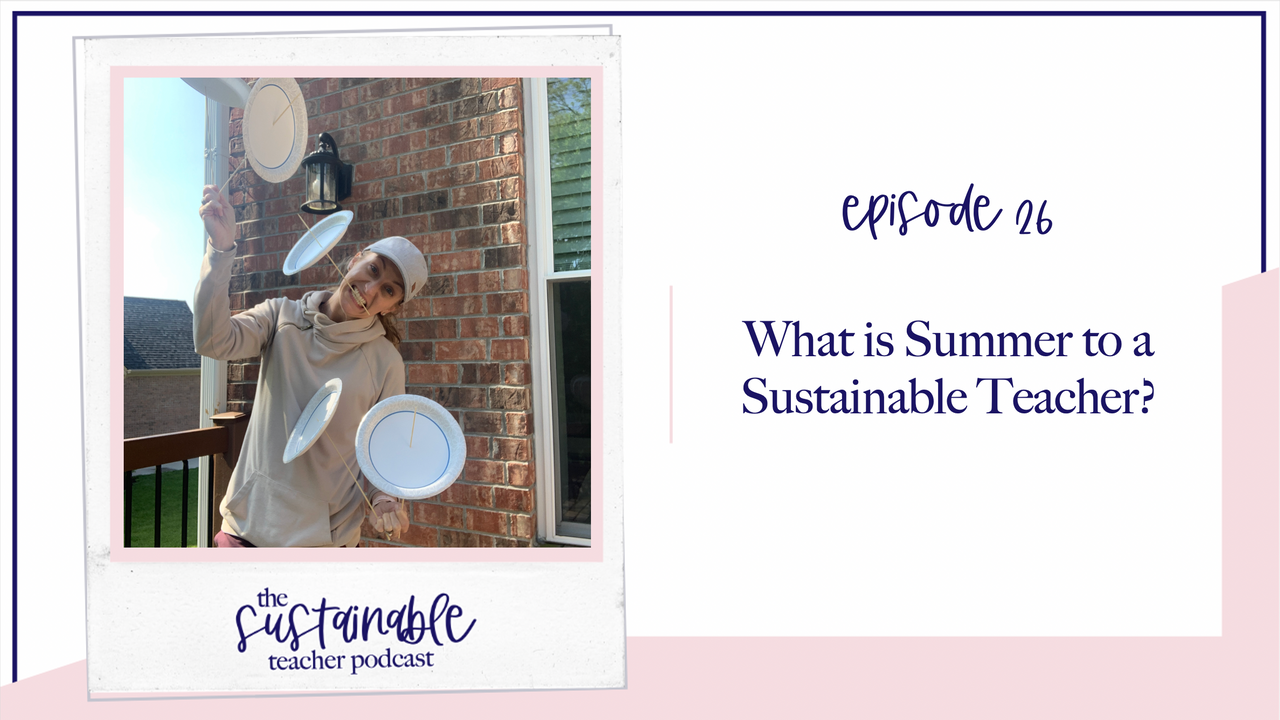
I have an analogy for you that will take us through the duration of this episode. Here it is. Throughout the school year, we each have multiple spinning plates in the air as teachers and as human beings. Each facet of our life is one spinning plate, and it’s our job to keep them spinning and in the air lest they drop and shatter.
Summer break, then, is a time for us to put down all the educational, teachery plates we keep spinning for 9-10 months of the year so that we can focus on other plates. Summer is an incredible thing for teachers - this is no news to you - but truly, it is time for us to refuel and rejuvenate in whatever aspect of our life we want.
In this episode I’d like to offer some food for thought on how we can use summer to fuel our sustainability throughout the year. Hence the title What is Summer to a Sustainable Teacher. So stick around areas within this topic that we’ll be pondering and discussing today, and if it’s an episode and a message that you’re lo...
Don't Do This ONE Thing in Your Classroom
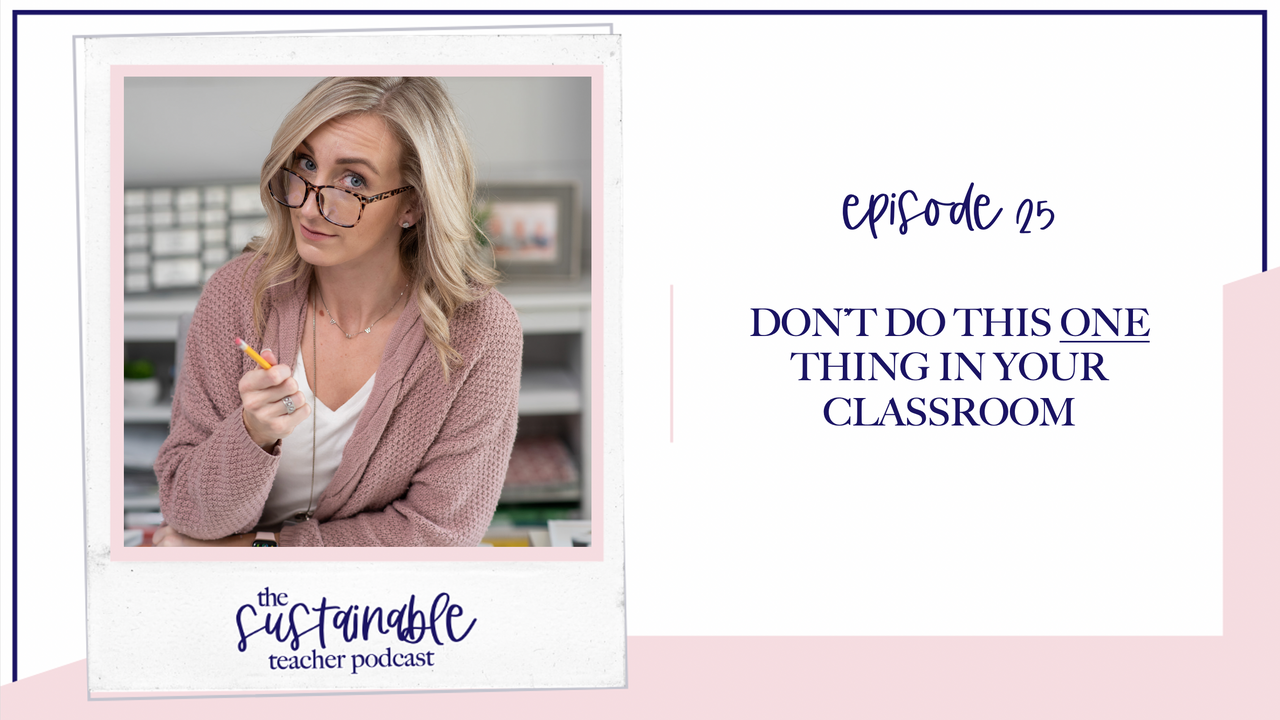
As teachers (and humans, really), we are provided with steps and formulas to follow in implementing great strategies, fixing our classroom management, and all other things teacher-life, at what seems like every turn. And I knowingly contribute to this, although I hope that my advice is valuable and helpful, but in this episode I hope to provide you with something NOT to, multiple steps NOT to take when it comes to improving upon and implementing strategies in your classroom.
And it really comes down to one piece of advice.
After listening to this episode you will know this ONE thing you shouldn’t do in your classroom because in not doing iit you’ll serve your own sustainability and your effectiveness with your students. You’ll feel empowered and ready to take next steps in strengthening your sustainable teacher-life.
So let’s get to it.
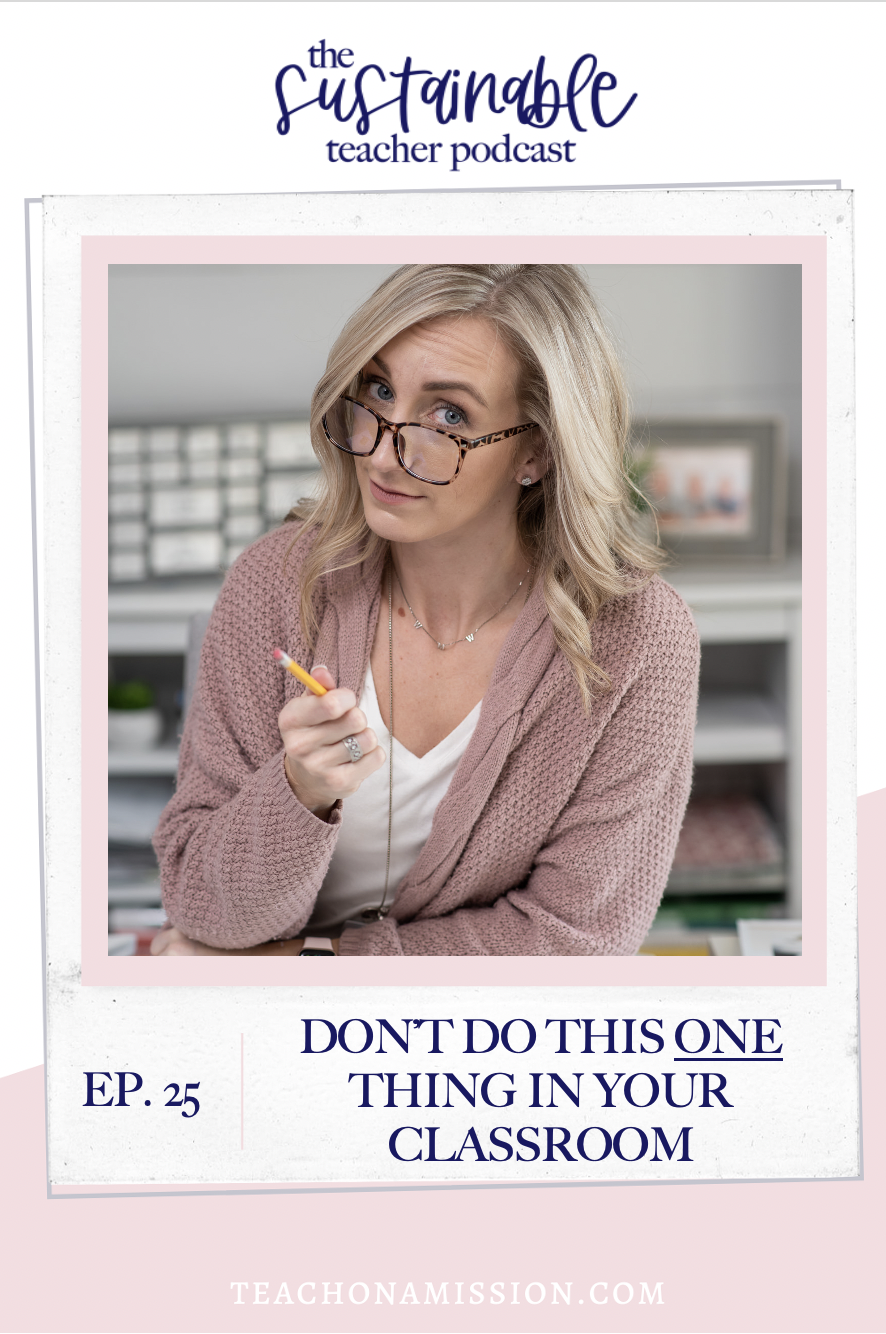
Picture this teacher-scenario really quickly. You want to make a change in your classroom, and regardless of what it is, you either don’t a...
A Teacher's Flipped Classroom Transformation Part 3

On today’s episode of the Sustainable Teacher Podcast I am so excited to welcome Charles Youngs, a 30-year high school English teacher in Western Pennsylvania, who has been recognized as a Pennsylvania State Teacher of the Year finalist, a Fulbright scholar, and is a frequent presenter at the annual convention of the National Teachers of English.
Currently he spends his days in a suburban public high school just south of Pittsburgh, teaching courses in Writing, Public Speaking and in AP Literature. That’s just part of his day. The other half is spent as an instructional coach for faculty on the ins and outs of ed tech.
Charles and my paths crossed in the spring of 2020, as he explains in the interview, when he was thinking about ways to make his time with students more intentional and more effective. He took my online course, Flipped Classroom Formula, and offers today a unique perspective on flipping, one that includes that of an English teacher and how to flip in an ELA class, ...
A Teacher's Flipped Classroom Transformation - Part 2

On today’s episode of the Sustainable Teacher Podcast I am so excited to welcome Jessica Verrill, a chemical engineer turned stay-at-home-mom turned high school chemistry teacher. She has been teaching chemistry at a small town academy in central Maine since 2018, has a wonderful husband, two fabulous teenage daughters, and a fun little dog named Ziggy. Jessica loves to spend time with her family kayaking on the local river, at camp on the New Brunswick border, and hiking in the mountains or on the beautiful coast of Maine.
Our paths first crossed in the spring of 2020, as Jessica will explain in the interview, where she attended my flipped classroom workshop. She then took my online course Flipped Classroom Formula, and is on the podcast today to share her classroom transformation amongst teaching in a pandemic and the success she and her students have experienced because of her hard work, and strategic decision to flip her classroom.
Topics discussed in today's episode inclu...
*BONUS* The Number ONE Question I Get Asked About the Flipped Classroom

What happens when students don’t watch the video notes for homework? That’s the number one question I get from teachers when they are considering flipping their classroom, and it’s a good one.
You should absolutely be asking this question because it means you are aware of an obstacle to your students learning, and now you can take steps to be sure you’re helping them overcome it. We have an entire module dedicated to this inside of my online course for teachers, Flipped Classroom Formula, and we address multiple obstacles, not just this one big one.
In today’s episode we are going to answer this question so that after listening you will feel hopeful and empowered by the possibilities of flipped video knowing that you’re making learning NOT optional in your classroom and in fact setting up your students for success.
Let’s get to it.

Learning is Not Optional
Here’s the gist of this entire episode in one sentence. You might want to write this down, are you ready?
When you fli...
Isn't Flipping Just More Work?

Isn’t flipping your classroom just more work? That’s the question, isn’t it? And it should be the question for all teachers when deciding what changes to make to their classrooms, especially coming off of one of the hardest years in education ever. And the question is really asking, is the work I put in going to be worth it?
Because here’s the truth, it’s not that flipping your classroom is more work… it’s that your classroom is work. Your students are work. So it’s a matter of knowing where you’re putting in time and effort and how it’s going to pay off, and this episode is all about helping your teacher work pay off for you and your students.
Let’s get to it.

Before we really dive into this episode I want you to remember episode 16, the Biggest Secret to Sustainability in Your Classroom, and if you haven’t yet, go back and listen to it because in that episode we talk about the number one secret to sustainability being to always be looking for the best return on your time ...
How to Know If Flipping is Right for You
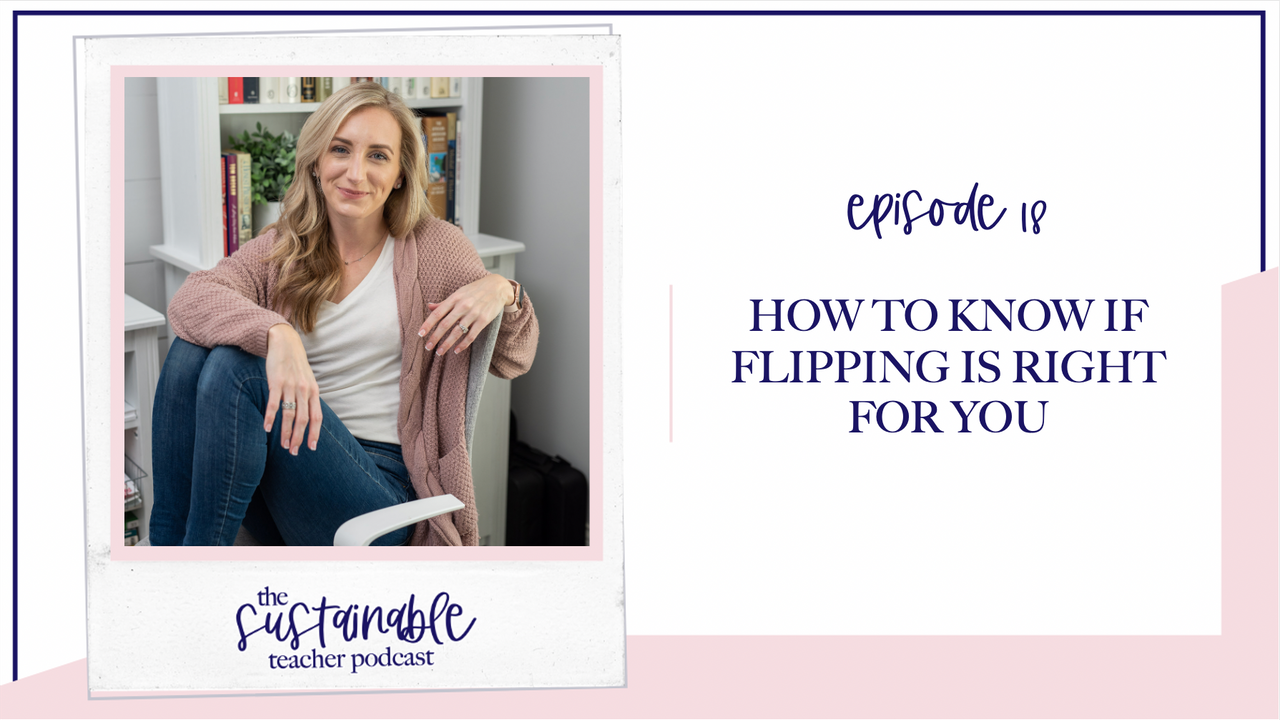
As soon as I share about my teaching experience or any teachers share about their current classroom, other teachers may relate to many similarities in our experiences, but others are able to quickly point out the differences.
So if I say this:
I taught at a suburban, predominantly white high school with students from all levels of socioeconomic status, teaching 10th grade American History, AP Psychology, and Sociology..
Then other teachers can say, well that’s not my classroom. I’m elementary or my school was more diverse or I teach ELA, math, science, fine arts, performing arts, health and PE etc.
It’s easy to find the differences in what we do as teachers.
And I must say… isn’t that so beautiful.
In today’s episode I want to highlight not just the differences in all our teaching experiences and classrooms, but more so your individual and incredibly unique classroom. What you teach, how you teach it, where you teach it, and who you teach it to are all factors that contribu...




